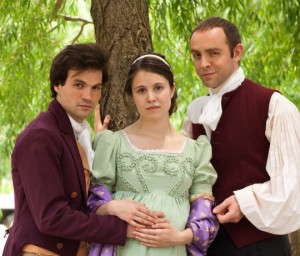Theater Review: Six Young Actors (and Their Director) In Search Of a Play
There are moments in Hideous Progeny (especially early in the second half) that grip and move the audience. But there are not enough of them. I dare this gifted troupe of theater makers to be more inventive, take greater risks, and live up to their so obvious promise.
Hideous Progeny by Emily Dendinger. Staged by Holland Productions at Boston Playwrights’ Theatre, 949 Commonwealth, Boston, MA, through July 23.
By Peter-Adrian Cohen

Cast members in the Holland Productions presentation of HIDEOUS PROGENY — the production could use more passion
I am sure this is not what this evening of theater was meant to be. But this is what came across as to me: six actors (and their director) in search of a play. True, I did like the enthusiastic cast, and I do like what the play is trying to do: Namely, have us see three famous, romantic poets—Lord Byron, Percy Shelley, and Mary Wollstonecraft Godwin—go at each other as they and three friends meet on Lake Geneva, Switzerland. The idea being that, as we watch their love-tangles, their jealousy of each other as poets, we will go home with a clearer sense of who they were.
That is the ambition, but the play doesn’t get there very often. And everybody is to blame.
Intentionally or not, Emily Dendinger, the playwright, does not give director and actors much drama to work with. Instead, what she gives them is a series of still lifes, mood pieces in the manner of Chekhov. If the essence of drama is confrontation in which the characters reveal themselves, there isn’t much of that in Hideous Progeny. True, the main characters often shout at each other at the top of their lungs; but that, I suppose, is more the directors and the actors attempt to fill the scene with some emotion after all.
In classical drama, the characters fight each other for something, and the more grand the thing, the more gripping the drama. Here, the dramatic engine—if you can call it that—is a bet among the three writers (do we dare call them friends?) as to who can write the most gripping horror-story. This bet could have lent itself to confrontation (and there is some of that) as well as bold strokes in bold colors; but the playwright decides to structure her story differently. Instead of bold strokes, she produces a drawing in fine pencil lines. A perfectly legitimate choice as Chekhov has demonstrated; but in place of confrontation, Chekhov focused on character, on detailed and patient rendering of his figures. Dendinger does a creditable job of this. But she does not go up close enough to her characters, with the result that the piece becomes static and often predictable.
Surely, the director also shares in the blame. She doesn’t push the actors enough to create more true, more interesting characters. Instead (as in real life), the actors resort to (stage) alcohol and to shouting, which, again as in real life, makes them more of a nuisance than worthy of our attention. One could object that these are young actors and a young director, and that they haven’t accumulated the wealth of experience to create convincing characters. I disagree. The actors in Hideous Progeny came across, to me, as ambitious, talented, and very alive. And yet in too few instances does their energy come across. And what I just said about the actors holds true for the director and the playwright: Somehow they are all searching for life and truth in the wrong place and often with questionable means.
I liked the costumes: the sophisticated colors, the relative simplicity. But, alas, here too, the costumes, like the set, do not venture beyond the expected.
And, as happens so often to even the most experienced theater people (where it’s even less excusable), this evening of theater is too long. Nothing takes away more quickly and more radically the goodwill the actors have built up than overstaying their welcome.
There are moments in Hideous Progeny (especially early in the second half) that grip and move the audience. But there are not enough of them. I dare this gifted troupe of theater makers to be more inventive, take greater risks, and live up to their so obvious promise.
